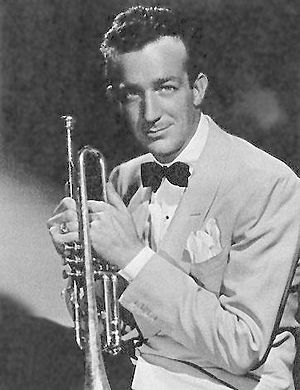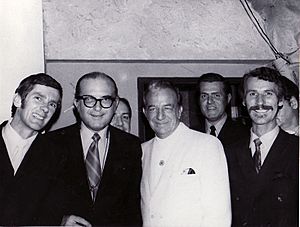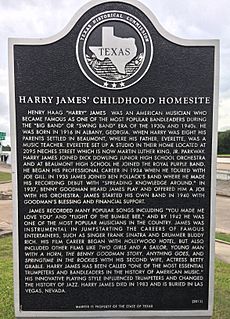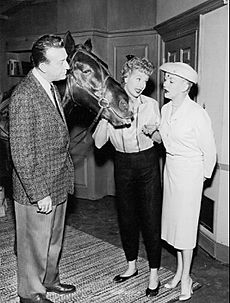Harry James facts for kids
Quick facts for kids
Harry James
|
|
|---|---|

James c. 1942
|
|
| Born |
Harry Haag James
March 15, 1916 |
| Died | July 5, 1983 (aged 67) |
| Spouse(s) |
Joan Boyd
(m. 1967; div. 1970) |
| Children | 5 |
| Musical career | |
| Genres | |
| Occupation(s) |
|
| Instruments | Trumpet |
| Years active | 1933–1983 |
| Labels | |
| Associated acts |
|
Harry Haag James (March 15, 1916 – July 5, 1983) was an American musician who is best known as a trumpet-playing band leader who led a big band from 1939 to 1946. He broke up his band for a short period in 1947 but shortly after he reorganized and was active again with his band from then until his death in 1983. He was especially known among musicians for his technical proficiency as well as his tone, and was influential on new trumpet players from the late 1930s into the 1940s. He was also an actor in a number of films that usually featured his band.
Contents
Early life

Harry James was born in Albany, Georgia, United States, the son of Everett Robert James, a bandleader in a traveling circus, the Mighty Haag Circus, and Myrtle Maybelle (Stewart), an acrobat and horseback rider. He started performing with the circus at an early age, first as a contortionist at the age of four, then playing the snare drum in the band from about the age of six. It was at this age that James was almost trampled by the circus trick horses after he wandered onto the circus track as they were performing their stunts, but he was protected by his mother's pet horse, who stood over him until the other horses rushed by.
James started taking trumpet lessons from his father at age eight, and by age twelve he was leading the second band in the Christy Brothers Circus, for which his family was then working. James's father placed him on a strict daily practice schedule. At each session he was given several pages to learn from the Arban's book and was not allowed to pursue any other pastime until he had learned them. While still a student at Dick Dowling Junior High School, he participated as a regular member of Beaumont High School's Royal Purple Band, and in May 1931 he took first place as trumpet soloist at the Texas Band Teacher's Association's Annual Eastern Division contest held in Temple, Texas.
Career
In 1924, his family settled in Beaumont, Texas. It was here in the early 1930s that James began playing in local dance bands when he was 15 years of age. James played regularly with Herman Waldman's band, and at one performance was noticed by nationally popular Ben Pollack. In 1935 he joined Pollack's band, but left at the start of 1937 to join Benny Goodman's orchestra, where he stayed through 1938. He was nicknamed "The Hawk" early in his career for his ability to sight-read. A common joke was that if a fly landed on his written music, Harry James would play it. His low range had a warmth associated with the cornet and even the flugelhorn, but this sound was underrecorded in favor of James' brilliant high register.
With financial backing from Goodman, James debuted his own big band in Philadelphia, Pennsylvania, in January 1939, but it didn't click until adding a string section in 1941. Subsequently, known as Harry James and His Music Makers, it produced the hit "You Made Me Love You", which peaked at no. 5 on Billboard's National Best Selling Retail Records chart for the week ending November 18, 1941. During its 18-week chart run, the single spent ten non-consecutive weeks in the Top Ten, from early November 1941 until late January 1942. He and his band appeared in three Hollywood films: Private Buckaroo and Springtime in the Rockies (both 1942), and Two Girls and a Sailor (1944). James toured with the band into the 1980s, and as of July 2018 the Harry James Orchestra, led by Fred Radke, was still very much in business.
Bandleader
James' band was the first high-profile orchestra to feature vocalist Frank Sinatra, who signed a one-year, $75 a week contract with it in 1939 ($1,589 a week in 2022). James wanted to change Sinatra's name to 'Frankie Satin', but the singer refused. Sinatra only worked seven months before leaving to join Tommy Dorsey's outfit. The James band's featured female vocalist was Helen Forrest, and his later band included drummer Buddy Rich and bassist Thurman Teague. Johnny MacAfee was featured on the sax and vocals, and Corky Corcoran was a youthful sax prodigy.
Radio
James' orchestra succeeded Glenn Miller's on a program sponsored by Chesterfield Cigarettes in 1942, when Miller disbanded his orchestra to enter the Army. In 1945, James and his orchestra had a summer replacement program for Danny Kaye's program on CBS. He also led the orchestra for Call for Music, which was broadcast on CBS February 13, 1948 – April 16, 1948, and on NBC April 20, 1948 – June 29, 1948.
Film
James recorded many popular records and appeared in many Hollywood movies. He played trumpet in the 1950 film Young Man with a Horn, dubbing Kirk Douglas. The album from the movie charted at #1, with James backing big band singer and actress Doris Day. James's recording of "I'm Beginning to See the Light" appears in the motion picture My Dog Skip (2000). His music is also featured in the Woody Allen film Hannah and Her Sisters. James's recording of "It's Been a Long, Long Time" is featured in Captain America: The Winter Soldier and in Marvel's Avengers: Endgame.
Personal life
James was married three times, first to singer Louise Tobin on May 4, 1935, with whom he had two sons, Harry Jeffrey James (b. 1941) and Timothy Ray James (b. 1942). They divorced in 1943. Later that year he married actress Betty Grable. They had two daughters, Victoria Elizabeth (b. 1944) and Jessica (b. 1947), before divorcing in 1965. In December 1967 James wed Las Vegas showgirl Joan Boyd. The couple had a son, Michael (b. 1968), before divorcing in 1970.
James owned several Thoroughbred racehorses that won races such as the California Breeders' Champion Stakes (1951) and the San Vicente Stakes (1954). He was also a founding investor in the Atlantic City Race Course. His knowledge of horse racing was demonstrated during a 1958 appearance on The Lucy–Desi Comedy Hour entitled "Lucy Wins A Racehorse".
James was a heavy smoker, drinker, and gambler. In 1983 he was diagnosed with lymphatic cancer, but continued to work. He played his last professional job, with the Harry James Orchestra, on June 26, 1983, in Los Angeles, dying just nine days later in Las Vegas, Nevada on July 5, 1983, at age 67. Frank Sinatra gave the eulogy at his funeral, held in Las Vegas.
Filmography
- Hollywood Hotel (1937) (as himself, in Benny Goodman's band)
- Syncopation (1942) (as himself)
- Springtime in the Rockies (1942) (as himself)
- Private Buckaroo (1942) (as himself)
- Swing Fever (1943) (as himself)
- Best Foot Forward (1943) (as himself)
- Bathing Beauty (1944) (as himself)
- Two Girls and a Sailor (1944) (as himself)
- Do You Love Me (1946)
- If I'm Lucky (1946)
- Carnegie Hall (1947) (as himself)
- I'll Get By (1950) (as himself)
- The Benny Goodman Story (1956) (as himself)
- The Opposite Sex (1956) (as himself)
- Outlaw Queen (1957)
- Riot in Rhythm (1957) (short subject; as himself)
- The Big Beat (1958)
- The Ladies Man (1961) (as himself)
- The Sting II (1983)
Discography
The discography of Harry James includes 30 studio albums, 47 EPs, three soundtrack/stage and screen albums, and numerous live albums and compilation albums, along with contributions as sideman and appearances with other musicians. James released over 200 singles during his career, with nine songs reaching number one, 32 in the top ten, and 70 in the top 100 on the U.S. pop charts, as well as seven charting on the U.S. R&B chart.
Selected singles
- "Ain't She Sweet"
- "All or Nothing at All" (1939)
- "Back Beat Boogie" (1939) (Columbia 35456)
- "Blues in the Night" (1941) (Columbia 36500)
- "Boo-Woo" (1939) (Brunswick 8318/B24060, Columbia 35958/C44-1)
- "Cheek to Cheek"
- "Ciribiribin" (1939) – another million selling disc
- "Cry Me a River"
- "Don'cha Go 'Way Mad" (with the Skylarks)
- "Flight of the Bumblebee"
- "Hernando's Hideaway" (1955)
- "Honeysuckle Rose"
- "I Cried for You" (1942)
- "I Don't Want to Walk Without You" (1942)
- "I Had the Craziest Dream" – a million selling gold disc.
- "I'll Be Around"
- "I'll Get By (As Long as I Have You)" (1940)
- "I Need You Now"
- "It All Depends on You"
- "It's Been a Long, Long Time" (1945)
- "I've Heard That Song Before" (1942) – another million selling record.
- "Life Goes to a Party"
- "Manhattan"
- "The Mole"
- "My Buddy" (1939)
- "Oh My Pa-Pa (O Mein Papa)"
- "The Nearness of You"
- "One O'Clock Jump" (1938) – James' first million seller
- "Sing, Sing, Sing" (1937)
- "Sleepy Lagoon" (1942)
- "Somebody Loves Me"
- "That Old Feeling"
- "Too Marvelous for Words" (1943)
- "Truly" (with Gilda Maiken and The Skylarks)
- "Trumpet Blues and Cantabile"
- "(Up a) Lazy River"
- "Velvet Moon"
- "When Your Lover Has Gone" (1944)
- "Where or When"
- "Woo-Woo" (1939) (Brunswick 8318/B24061, Columbia 35958/C44-2)
- "You Made Me Love You" (1941) – a million selling gold disc.
- "You've Changed" (1941)
Selected albums
- Boogie Woogie (Columbia C44, 1941, compilation)
- Young Man with a Horn (Columbia CL 6106, 1950)
- Jazz Session (Columbia CL 669, 1955)
- Wild About Harry! (Capitol T/ST 874, 1957)
- The New James (Capitol T/ST 1037, 1958)
- Harry's Choice! (Capitol T/ST 1093, 1958)
- Trumpet Rhapsody And Other Great Instrumentals (Harmony HL 7162, 1959)
- Harry James and His New Swingin' Band (MGM E/SE 3778, 1959)
- Harry James...Today! (MGM E/SE 3848, 1960)
- The Spectacular Sound of Harry James (MGM E/SE 3897, 1961)
- Harry James Plays Neal Hefti (MGM E/SE 3972, 1961)
- Requests On-The-Road (MGM E/SE 4003, 1962)
- The King James Version (Sheffield Lab LAB-3, 1976)
- Comin' From A Good Place (Sheffield Lab LAB-6, 1977)
- Still Harry After All These Years (Sheffield Lab LAB-11, 1979)
- Snooty Fruity (Columbia CK 45447, 1990)
- Record Session '39–'42 (Hep CD1068 [Scotland], 1999)
- Feet Draggin' Blues '44–'47 (Hep CD62 [England], 1999)
Awards
Grammy Hall of Fame
As of 2016, two recordings of Harry James had been inducted into the Grammy Hall of Fame, a special Grammy award established in 1973 to honor recordings that are at least 25 years old, and that have "qualitative or historical significance."
| Year recorded | Title | Genre | Label | Year inducted |
|---|---|---|---|---|
| 1942 | Trumpet Blues and Cantabile | Jazz (Album) | Columbia | 1999 |
| 1941 | You Made Me Love You (I Didn't Want to Do It) | Pop (Single) | Columbia | 2010 |
Readers' polls
Metronome magazine conducted annual readers' polls ranking the top jazz musician on each instrument. The winners were invited to join an ensemble known as the Metronome All-Stars that was assembled for studio recordings. The studio sessions were held in the years 1939–42, 1946–53, and 1956, and typically resulted in two tracks which allowed each participant a one chorus solo. Harry James was chosen to play trumpet with the Metronome All-Stars in 1939, 1940 and 1941.
A similar annual readers' poll conducted by Downbeat magazine selected James as the best trumpet instrumentalist for the years 1937, 1938 and 1939, and as favorite soloist for 1942.
Honors and inductions
For his contribution to the motion picture industry James was awarded a star on the Hollywood Walk of Fame at 6683 Hollywood Boulevard on February 8, 1960.
He was inducted into the Big Band and Jazz Hall of Fame in 1983.
Writings
- Harry James Studies & Improvisations for Trumpet, Harry James, ed. Elmer F. Gottschalk, New York: Robbins Music, 1939
- Harry James Trumpet Method, Harry James, Everette James, ed. Jay Arnold, New York: Robbins Music, 1941
See also
 In Spanish: Harry James para niños
In Spanish: Harry James para niños
- Al Lerner (composer)
- Dick Haymes
- Jack Gardner



